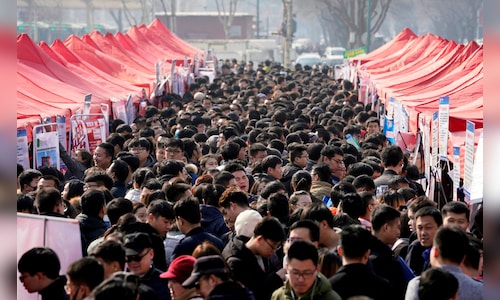The phrase has become a buzzword on social media this year, drawing parallels with the slogan “rotten-tailed buildings” for the tens of millions of unfinished homes that have plagued China’s economy since 2021.
This year, a record number of college graduates are looking for work in a labor market depressed by COVID-19-induced disruptions as well as regulatory measures in the country’s finance, technology and education sectors.
The unemployment rate for China’s roughly 100 million young people aged 16 to 24 topped 20% for the first time in April last year. When it hit a record high of 21.3% in June 2023, authorities abruptly suspended the data series to reassess how the figures were compiled.
A year later, youth unemployment remains a headache: The reconfigured jobless rate hit a 2024 high of 17.1% in July, while 11.79 million college students graduated this summer in an economy still burdened by its housing crisis.
President Xi Jinping has repeatedly stressed that finding jobs for young people remains a priority. The government has called for more channels for young people to reach potential employers, such as job fairs, and has rolled out business support policies to help boost hiring.
“For many Chinese college graduates, better job prospects, upward social mobility and a brighter life outlook – all things once promised by a college degree – have become increasingly difficult to achieve,” said Yun Zhou, an associate professor of sociology at the University of Michigan.
Some unemployed young people have returned to their hometowns to be “full-time children”, depending on their parents’ retirement pensions and savings.
Even those with graduate degrees have not been spared.
After spending years climbing China’s ultra-competitive academic ladder, “rotten children” are finding that their grades do not guarantee them jobs in a bleak economy.
Their options are limited: either they lower their expectations of getting well-paid jobs or find whatever work they can to make ends meet. Some have even turned to crime.
Zephyr Cao earned a master’s degree from the prestigious China Foreign Affairs University in Beijing last year.
Now 27 and back in his home province of Hebei, Cao stopped looking for full-time work after lower-than-expected wages made him question the value of his education.
“If I were to work three or four years after finishing my undergraduate studies, my salary would probably be similar to what I get now with a master’s degree,” Cao said.
Cao said he was considering pursuing a PhD in the hope that his prospects would improve in a few years.
Amada Chen, a recent graduate of Hubei University of Chinese Medicine, quit her sales job at a state-owned enterprise last week after just one month.
She attributed her decision to the toxic work culture and unrealistic expectations of her boss. For the first 15 days of her probationary period, she was also paid just 60 yuan ($8.40) a day despite having to work 12 hours a day.
“I cried every day for a week,” she said.
Chen wanted to become a quality inspector or researcher, jobs she thought would match her skills as a student of traditional Chinese medicine.
But after more than 130 application letters, she was offered positions mainly related to sales or e-commerce.
Chen said she was completely reconsidering her career path and might pursue modeling.
UNCERTAIN OUTLOOK
Unemployment among college graduates is not an unprecedented phenomenon.
In 1999, China dramatically expanded university enrollment capacity in an attempt to produce a better-educated workforce to fuel its rapidly growing economy.
But the supply of graduates continued to outstrip the supply of jobs, and in 2007 authorities expressed concern about job availability, a problem that lessened but never entirely disappeared as more young people with degrees entered the job market.
Prospects are uncertain even when a student’s major aligns with market needs.
Shou Chen completed his third year at Beijing University of Posts and Telecommunications this year, majoring in artificial intelligence.
However, Chen has yet to secure an internship after more than a dozen applications and remains pessimistic about the job market.
“It could be worse,” he said. “After all, there will be more and more people (in this field).”
The supply of college students will outstrip demand between 2024 and 2037, after which the effects of falling fertility rates will be felt and the gap will narrow dramatically, according to a study published in June by China Higher Education Research, a journal under the Ministry of Education.
The number of new college graduates is likely to peak at around 18 million in 2034, he said.
Disclaimer:
The information contained in this post is for general information purposes only. We make no representations or warranties of any kind, express or implied, about the completeness, accuracy, reliability, suitability or availability with respect to the website or the information, products, services, or related graphics contained on the post for any purpose.
We respect the intellectual property rights of content creators. If you are the owner of any material featured on our website and have concerns about its use, please contact us. We are committed to addressing any copyright issues promptly and will remove any material within 2 days of receiving a request from the rightful owner.

